The value of P4C has never been higher.
The last few years have seen a pandemic and several years of government making nothing easier and many things harder for schools.
But the importance of independent thinking, children finding their voice, and listening to each other when they do, will never change.
You probably know P4C is proven to make an impact in all of these areas, but...
- You have tried it in the past, but traditional stand-alone sessions won't fit an already crowded curriculum
- You've had training before but there's been a fair bit of staff turnover
- Teachers are wary of taking on “yet another thing”, whatever it is!
So how can you support colleagues to make it work within your existing curriculum?
Introducing Philosophy Circles: How to Embed P4C in the Curriculum
Friday 27th October 2017 / Saturday 28th October 2017 , JHB
This full day course with both Jason Buckley will help you grasp the principles of Philosophy Circles, put them into practice, and share them with your colleagues. It includes the option to purchase over 100 school topic session plans and other resources that will allow your school to embed philosophy for all age groups.
Fri 27 Oct 2017 Holy Rosary School (Edenvale, JHB)
To book, email Diane Horsten dihorsten@holyrosaryschool.co.za
Banking Details:
Holy Rosary School
First National Bank
Greenstone Branch
Account No: 546 806 85865
REFERENCE: School Name + JB P4C
Sat 28 Oct 2017 Redhill School (Morningside, JHB)
To book, email Kemble Elliott kelliott@redhill.co.za
Banking Details:
Redhill School Trust
Standard Bank
Account No: 021 595 658
Branch Code: 018 105
REFERENCE: School Name + JB P4C
Prices:
For one person R1800 (This includes attendance, all materials and catering)
For two people R2800 (A significant saving!)
Add a third, fourth and so on R800 per extra person (Really worth your while!)
Help children find their voices
More and more children arrive at school with poor speaking skills
Parents distracted by social media speak less to their children, and the impact is growing. In one school with many younger parents, children joining reception completely nonverbal rose from five, to half to the class.
If they don't learn to talk confidently to groups in their primary years, it's unlikely they ever will. That impacts their learning, and their economic and social wellbeing. You'll learn how to overcome the different obstacles children have to speaking, and get (almost) every child talking:
- Playground Confident, Classroom Shy - how to empower children who clam up in the classroom
- Feed Forward: a simple change to give speech-poor children time to catch up
- Chance, Chain, Choose - how to reduce inequality in the classroom
- Separating Thinking and Speaking - how to beat the "I dunno" card
- Unwrongification - how to free children from the fear of getting it wrong
- Small Talk Big Talk - how to keep them talking while raising the stakes
Children speak best when they are standing up
They don't go to dinner parties or sit around in the pub. The Get Moving activities explained in this course get children talking from the first minute. Learn how this high-energy approach works, so that you can engage your learners in talk not just in philosophy but across your teaching.
- How to make thinking a game by making it physical
- Community-building activities to help your class collaborate
- How philosophy playfulness leads to "deep fun"
- How to create shared experiences that stimulate thinking
- Argumentag and other debate games that build confidence
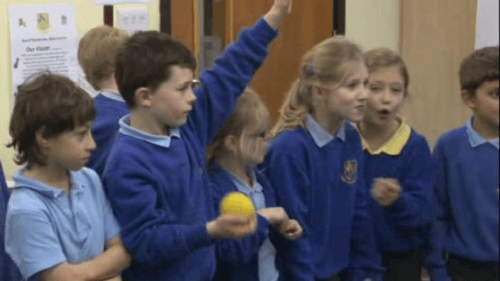
Y-Questions that stretch but don't scare
Less confident speakers can fear speaking in class in case they get it wrong. That freezes their speaking while more confident children do the talking and speed ahead. The Y-Questions at the heart of Philosophy Circles are difficult to decide and hard to be sure of. This allows less confident learners to feel they won't get it wrong, while giving a greater challenge to able children who are used to getting it right. In the course and supporting resources, you'll learn:
- Why closed questions can be better than open ones
- How to find stimuli that encourage thinking, but don't say what to think
- How Philosophy in Role in your topics engages children's imaginations
- How children can create their own Y-Questions - and when to use your own
- How children can tell stories that enrich their thinking and writing
It has been fascinating to watch the children engage with a range of challenging topics with maturity, enthusiasm and empathy thanks to the facilitation provided by Tom. Their curiosity was inspired by the thought-provoking stimuli in each session and several individuals, who usually find it challenging to share their ideas, came to the fore during the big discussions.
Pupils comment that they are thoroughly enjoying P4C and enthusiastically anticipate their lessons with Tom each week; they also site that ‘they enjoy the challenges to their thinking.’
Since commencing P4C, we have noticed a dramatic increase in the children’s ability to discuss concepts with their peers and they have vastly improved in their ability in looking at one another when speaking, in actively listening to one another and in building upon and challenging others’ views and opinions. Before the lessons started, the children were not listening deeply to one another and responding to one another constructively – they had their opinion and that was it. We have also noticed an increase in confidence and concentration.
Initially, the children tended to direct their responses towards the adult. After a couple of weeks however, they were looking at the child they were responding to and dialogue bounced around the room without adult intervention.
The children’s critical reasoning skills were also developed; children were starting to support their views with reasons.
Enquiry based methods are also being instigated by the pupils themselves in other curriculum areas:
- Who is the villain in Macbeth?
- Who is responsible for King Duncan’s death?
- Was the Highwayman guilty of any crime?
- Is jealousy an acceptable motive for murder?
- Can murder ever be justified?
As teachers, we are excited about working elements of P4C into our day-to-day classroom practice, particularly when creating and discussing questions during class reading sessions.
Shareen Johnson and Jonathan Hall, Amesbury Primary School
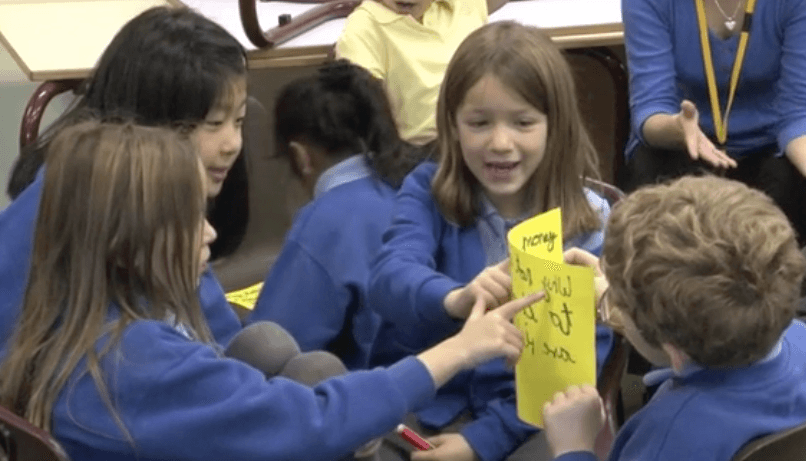
Practical for Teachers
How planning less gives more space for children’s independence
With the ever-increasing pressure from above, teachers feel more and more accountable for planning every minute of children’s learning. It creates a dependency culture, with children always looking to the teacher. Learn how planning less and letting the questions do the work fosters greater independence and faster progress.
- Scribe, don’t script: how to be at the service of a discussion instead of leading it
- Sessions that support deeper reflection about seasonal events such as Christmas, harvest and Easter
- How to create deep, worthwhile discussions within a 30 minute timetable slot
- Dozens of ready-to-use activities you can adapt for any context
- “Making it real” time within the course to start applying the principles to your teaching
- Simple, memorable principles that connect with your values as a teacher

Go into orbit: why your physical position in the classroom is key - and needs to change more than you'd think
We have to be able to command children’s attention in order to teach. But the techniques which establish our presence work against us when we want children to look to one another for answers. Learn some tested techniques for changing your role in the classroom by something as simple as where you sit.
- How to take a step back and let children develop independence
- How giving children “teacher power” improves discussions
- How to deepen their thinking rather than adding your own
- Forgetful Storytelling - a joyful route to a collaborating class
- How to be a philosophical teacher without having studied philosophy
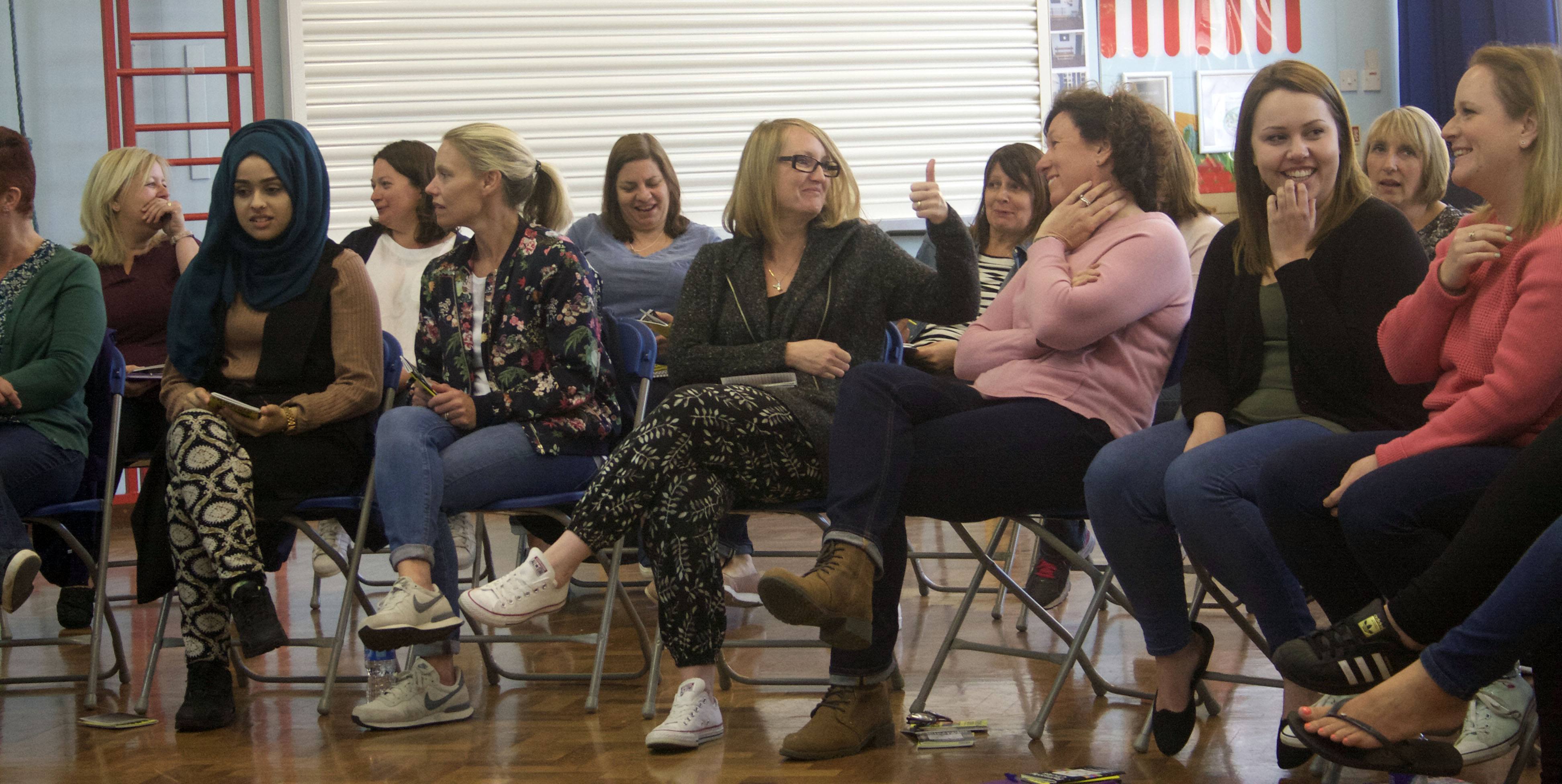
Spreadable to your Whole School
Handouts from training courses often sit in the "INSET graveyard'. It's full of ideas that sounded great on the day but which never quite got passed on to colleagues. Teachers are very busy, and so new initiatives often get buried under the hectic pace of day to day teaching. To avoid that, the course includes attractive minibooks that are written with busy teachers in mind, and a huge range of resources so that there's every support for you and colleagues to start straight away: everything you need is provided.
Minibooks that make the key principles easy to absorb
All the key ideas of Philosophy Circles have been carefully constructed around three principles. These are explained in an A6 minibook that is succinct enough for even a busy teacher to find the time to read.
Get Moving - high-energy, active techniques to maximise engagement
Y-Questions - how to find questions that will provide real challenge
Take a Back Seat - how to change your role to give children independence
The book has memory aids in the form of stories, summaries and catchily-named activities so that it is easy for colleagues to make it part of their general teaching style.
You’ll also receive copies of the Thinkers’ Games minibook
- Strategies for making thinking physical to promote engagement
- Techniques and frames for question creation
- Over 30 flexible games that can be adapted for any subject matter
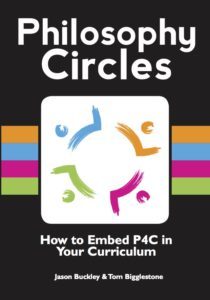
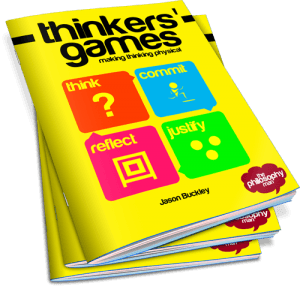
Option to Purchase: The Philosophy Circles Resource Pack for R2000
10 copies of each minibook
130 session plans for use within the curriculum
39 'Spot and Stripe' videos for use with young children
Most teachers who discover philosophy for children love the idea, but can’t find an hour for a session that does not connect to a crowded curriculum. So P4C gets squeezed out, and children miss out on the chance to deepen their thinking.
This course includes the option of purchasing a wealth of resources for 30 minute sessions on the most popular school topics. It makes it another, richer way to do what you do already, rather than something else to squeeze in.

What's in the additional session plans?
Over 130 session plans with a consistent, easy to follow format, plus a wealth of supporting stimuli and other resources.
The Snail and the Whale
The Lighthouse Keepers’ Lunch
Fairytales
Myths and Monsters
Poetry
St. George and the Dragon
Harry Potter
Tame and wild animals
Evolution
Living forever
Human development
Mind and body
Seasons
Sound
Sustainability
Working scientifically
Trade
Numbers
20th century
Ancient Civilisations
Ancient Egyptians
Ancient Greeks
Anglo-Saxons
Aztecs
Monarchies
Invaders and Settlers
Normans
Romans
Stone Age
Tudors
Victorians
World War One
Religious Education
Buddhism
Christianity
Christmas
Comparative Religions
Hinduism
Art, Design and Technology
Painting
Design
Health and Diet
Tools
Computing
t
Behaviour
Bullying
Changes and new beginnings
Citizenship
Ethics
Friendship
Mental health
Self-image
PE
Teamwork
Over 120 curriculum based session plans
Self- and peer- assessment tools
Training Videos
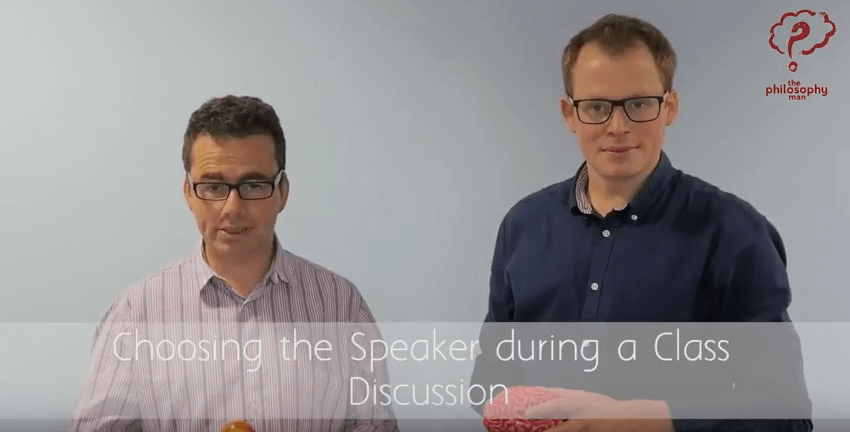
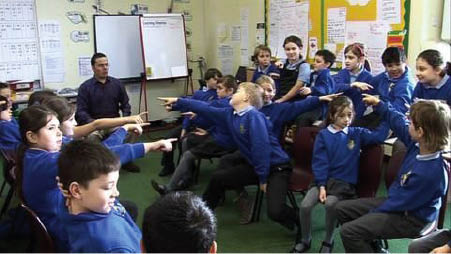
These resources inspire and instigate current discussions with the children which can occur in many curriculum areas. The mini resource booklets are great too as they are concise and clear. The resources are practical, effective and require very little preparation- which is great!
Though we have separate P4C sessions, we have easily and seamlessly begun to use it in other curriculum areas.
Kayleigh Dell, Greenway Primary School
Tailored resources so philosophy starts in the early years
Much school training is focused on older pupils, with Early Years teachers left to adapt as they can. Our sequence of a year’s worth of professionally filmed “Spot and Stripe” videos provide the perfect introduction to philosophy for younger children, introducing children to discussion and argument through colourful, fun characters and irresistible questions.
What’s the difference between Philosophy Circles and “traditional” P4C?
All P4C gets children thinking about challenging questions, and teachers act as facilitators rather than knowledge-givers. Traditional P4C follows a series of stages. Children see or read a stimulus, think about the ideas in it, create questions, evaluate the questions, and then choose one to talk about. In Philosophy Circles, the facilitator usually asks the first question, so the discussion gets started faster. The children’s own questions are still important, but they emerge through discussion. Rather than stages, Philosophy Circles is built around three facilitation principles which run through the whole process. It makes it more fast-paced and versatile for use across the curriculum.

This all sounds great, but what will inspectors say?
With the relentless focus on data, everything schools do has to show an impact on maths and literacy. Fortunately, not only do school inspectors look very favourable on Philosophy for Children, but a recent EEF study demonstrated that it had a positive impact on both maths and literacy scores. We are excited about philosophy for its own sake, but it’s nice to know that it has a benefit for measurable outcomes, and in particular that it helps to diminish the difference between disadvantaged children and their peers.
‘Philosophy for Children is giving pupils the skills they need to present a point of view and become more articulate, thus boosting their confidence
St Matthews School, Westminster
“Impressively, year 2 pupils can identify ethical dilemmas in their fiction books and propose related questions for discussion in philosophy lessons” “Philosophy lessons challenge pupils to respond to probing questions, such as, “Are all humans connected in some way?”
Churchfields Infant School, South Woodford
The school advises and supports other schools in the use of philosophy with children. This exemplary practice is spreading throughout the school and is having a positive impact on pupils ‘communication and thinking skills and this is beginning to be reflected in their achievement. In an excellent philosophy lesson in the nursery children were challenged to think about the characteristics of two imaginary characters and whether they would change depending on their facial expressions or on what they wear. The curriculum is broad and balanced and meets pupils’ needs well, including the excellent promotion of their spiritual, moral, social and cultural development and philosophy.
SparHawk Infant and Nursery School, Norfolk
In a year 5 and 6 philosophy lesson, excellent use was made of a recently released Christmas advertisement for a famous store to encourage pupils to identify sophisticated concepts such as reliability, hope, trust and friendliness. This work made a particularly good contribution to developing their social and moral awareness
North Lakes School, Penrith
‘The thought provoking and exciting curriculum the school has developed over the last two years is an outstanding component of the school’s success (this includes) the development of ‘Philosophy for Children’, a powerful tool which both excites the pupils and gives them the confidence to explore stimulating and challenging ideas and concepts. It not only strengthens their academic learning, but also encourages their empathy for others and gives them insights into the adult world
Ropsley Primary School
BONUS: Everything you need to run a successful training
Many teachers who are perfectly happy talking to a class o f thirty children are much less comfortable training colleagues. Setting yourself up as “the expert” and sharing what you have only just learnt make you feel something of a fraud.
f thirty children are much less comfortable training colleagues. Setting yourself up as “the expert” and sharing what you have only just learnt make you feel something of a fraud.
During the course, we draw attention to our “tricks of the trade” as trainers. You get access to a set of “Spreadability” audio files with advice on how to run an effective training session with colleagues, as well as a Powerpoint and session plan for a staff meeting introducing the key ideas. With the range of resources included, you can equip everyone with full session plans for immediate use!
Also in the series...
Cars
Children
Shopkeepers
Grown-ups
Teachers
Time-Travel
Dragons
Jobs
Jokes
The Wild West
Exploring
Letters
Christmas
Sailors
Magic
Superpowers
Pirates
The Park
Seasons
Uniform
Town and countryside
Flying
Animals
Underwater
Books
Tidying
Easter
Friends
Anger
Shapes
Stories
Happiness
Thinking
Boredom
Pets
Technology
Course information
The course will be held at Laycock PDC, Islington
The venue is 2 minutes walk from Highbury and Islington Underground Station
Click here for map and public transport options
Arrive 9.15 for a 9.32 start, and finishing at 3.57. (Yes, those really are the times!)

